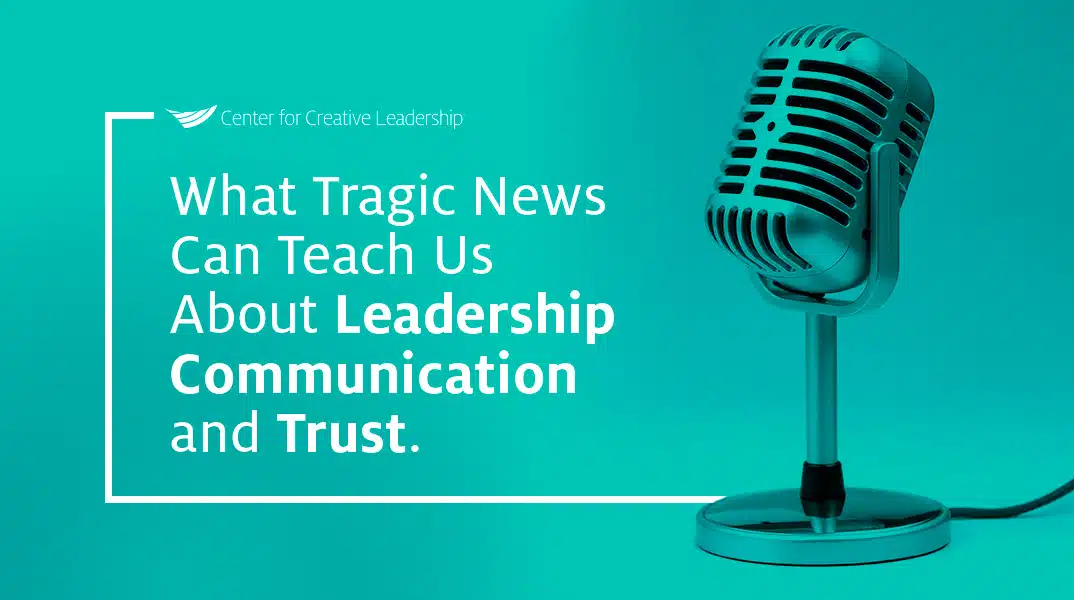- PODCAST
Lead With That: What Tragic News Can Teach Us About Leadership, Empathetic Communication & Trust

In this episode of Lead With That, Ren and Allison explore what we can learn about leadership communication and trust from the difficult few weeks of tragic news stories that have broken in the US and around the world.
The recent news cycle has been difficult to take in. Tragic, sad, intense. The impulse for leaders and their team members may be to compartmentalize and pivot the conversation, but so much of what’s happening deserves recognition and discussion.
What can leaders do to create an environment at work where employees can feel safe with their emotions, and don’t have to pretend things are just okay? How can organizations prioritize the wellbeing and belonging of their employees, while keeping work moving?
Let’s explore how tragic things happening in the world can be met with empathetic communication and trusting relationships, and lead with that.
Listen now or read the full transcript below.
Listen to the Podcast
In this episode, Ren and Allison explore what we can learn about communication and trust from the difficult few weeks of tragic news stories that have broken in the US and around the world.
Interview Transcript
INTRO:
Welcome back to CCL’s podcast, Lead With That, where we talk current events and pop culture to look at where leadership is happening and what’s happening with leadership.
Ren Washington:
These last few weeks have been, they’ve been interesting. Tragic, sad, intense. Frankly, every week we get together to record, something tragic, something horrible, something we’re desperate to discuss comes up, but we try to find something else to talk about. And I guess it makes sense. We’re a leadership development company at CCL. We want to look at the world and talk about leadership, find ways to help you as a leader and our listener to feel empowered in the face of all that’s happening.
So we pivot, but so much of the world, so much of its tragedy deserves recognition. Maybe more than recognition. It probably deserves some discussion. And so maybe leadership isn’t so far away from all of this. Maybe it’s a leader’s job to create an environment at work where we don’t have to pretend things are just okay. At CCL, we believe organizations must prioritize the wellbeing and belonging of their employees. And so with so much happening in the world, we wanted to honor that. And we wanted to explore how tough things in the world can teach us about difficult conversations at work.
Welcome back everyone. I’m Ren Washington, and as usual, I’m joined with Allison Barr. Allison, what’s one of the hardest things you’ve had to work through on the job?
Allison Barr:
Well, I want to admit that you asked me this last week and I thought about changing my answer because it’s difficult. And then I realized, to your point, a lot of these things are worthy of conversation. And before I answer your question, I want to give our listeners and people a content warning that I will refer to some violent events. And so giving people a chance to opt out should that be upsetting or triggering for you.
Ren Washington:
Yeah. Thanks.
Allison Barr:
And to answer your question, when I was a manager, this was prior to my work at CCL, I managed at a time when there were two mass shootings. The first one was two miles from where I worked.
Ren Washington:
Wow.
Allison Barr:
And then the second one, a few years later, was at large for a few hours on the street where I worked, so that was very intense.
Ren Washington:
Yeah. And how did you all deal? What did management, what did leadership say or do when that was happening?
Allison Barr:
Well, the first time was on a property where there were several other businesses and we knew their protocol for this kind of thing and were able to respond quite quickly. However, we were still expected to be working during that time and I made the executive decision not to mandate that. However, there were a few people who said, “You know what? I would like to continue working to keep my mind off of things,” which is certainly understandable. And the rest of us really bonded together, some called their families and so on.
And the second time was a different location. I was in a huge office building with only one other person because people had left for the day and it was a Friday. And my boss called my cell phone and she was wonderful and just asked if I was okay and if I wanted to stay on the phone with her. And she clarified many, many times that the work did not matter in that moment.
Ren Washington:
Thank God.
Allison Barr:
Yes.
Ren Washington:
Yeah. First takeaway of the day, everyone, if you’re a leader or a manager and there’s something horrible going on, staying on the phone and being like, “Cool, by the way, you still going to make your deadline?” Don’t do that.
Allison Barr:
Right.
Ren Washington:
That’s not what we’re here to talk about. But I do think those are really interesting examples of what we are going to explore today, which is this idea of how do we compartmentalize these things or do we even? You mentioned something, that we still had to work, and I couldn’t help but wonder, what kind of work is happening when these things are going on?
Allison Barr:
It’s not effective, right? Not your best work. Although, when I think about those people who said, “I want to continue working,” perhaps for them, it was, right? People channel their emotions in different ways and I think that prioritizing people when there is something like a mass shooting happening feels so obvious to me. And whether or not you are directly impacted, there’s still an impact. And when I think back to that moment, for me, it was much like, have you seen those cartoons where the cartoon has their finger stuck in a light socket and their hair is, they just look like they’re completely shocked.
Ren Washington:
Yeah. You see their skeleton? Yeah.
Allison Barr:
Yeah. Yes, yes. And feeling electrocuted. And once you have your finger in the socket, there’s not a whole lot you can do about it. And that’s, in some ways, how it felt. Just unsure of what to do, feeling a lot of energy in that moment and unsure of what the right direction is to take. And I would say, I wouldn’t change that decision of telling people they don’t have to work because it was the right one. There’s a difference between having something difficult happen at work and having a tragedy. And tragedy, of course, causes an emotional response that should be prioritized, in my opinion. What do you think?
Ren Washington:
Well, I can’t help but think around this idea of prioritizing, because one might say, “Well, Allison, your experience was horrifying and scary and it happened live to you.” Even those who said, “I’d rather work,” I can’t imagine if you’d be able to focus if you’re also getting email pings around the location of the active shooter or what’s going to happen if someone goes onto your floor. And I don’t know if I’m going to be diligently punching in the numbers if then too I’m getting my Outlook chime that’s a movement locator.
Allison Barr:
Right.
Ren Washington:
Now, maybe too though, I wonder, okay, well, fine, that’s just a really unique example. And no one, I think, is asking people to, in those circumstances, just suck it up and work. But zooming out a little bit, you talk about the tragedy and tragedy being something that should be honored and maybe thinking of the person is the right thing to do, as you said.
And so what about tragedy that’s a little bit further away from us? Where things are happening in and around the world, but we always hear leaders or organizations say, “We come to work, we come to work. We leave everything else at the door.” I wonder what kind of work is happening if you, my friend, Allison, I know you’re in that building when this is going on. And I’m not in the building, I’m just at my office. And I think, “Oh man, my friend’s over there. I hope she’s going to be okay.” What kind of work’s getting done there? And I wonder, how do you manage the person who’s not in the experience, but who’s next to it, adjacent to it?
Allison Barr:
Sure. Well, I think this becomes tricky because individuals have different responses to tragedy and traumatic events, right? So this becomes complex. And I think the first step is understanding that people are complex and that should you be concerned about me and my safety, at least an acknowledgement of the situation from leadership would be helpful, right? “Hey, we know that part of our team is in this scenario right now and we want to give you the space to do X, Y, Z.”
And that could look like, “We want to give you the space to talk to your manager,” or, “We want to give you the space to step away from your work for a few hours.” There has to be some sort of strategy around communicating in a crisis and crisis management that’s different than how we have it now. And that’s because we have, unfortunately, major events like this happening frequently.
Ren Washington:
Well, I had two questions that came up for me as you’re thinking about why do we have to, and then what does it look like now? And so you’re saying maybe start there, what is a typical response to crisis management? And then why does it need to be different?
Allison Barr:
There’s a framework to leading through a crisis. And it’s my understanding that crisis was defined as perhaps their company’s in some financial distress or crisis could mean a mass reduction in force, which sure those are crises, but now we’re looking at this from a different lens.
So I read some research last week that stated that, sure, burnout is a problem right now, however, there’s an increase in stress levels, an increase in diagnosed PTSD. I want to pause on that because do you know how many people go undiagnosed with that as well? So I would argue that the number’s a lot higher than we see in the research. And a decrease in overall team morale.
So considering crisis management to include a little bit more about mental health is going to be very important. And it’s complex, I know that, it really, really is complex. And I know that companies have made great strides in attempting to normalize mental health conversations. And unfortunately, what I also found is that most employees don’t use mental health benefits. And so it makes me wonder how much society needs to change or the stigma around mental health and wellness first being the first step.
And so I do think it’s a leader’s responsibility to do their best to reduce that stigma around mental health, because your response to half of your team being in an environment where there’s a mass shooting could be very different than Susie Smith who’s sitting next to you, whose child was unfortunately a target and got harmed in a previous shooting somewhere else, right? It’s very complicated.
Ren Washington:
Well, let’s move even further away from that person who’s channeling that event that happened to them or close to it. And I’m a manager who is operating a workshop and we’re spread out around the world and our team’s getting together. And then all of a sudden on the news we see on the ticker that protests have moved closer to the White House. And then before we see it, we see a conversation where now some protestors are trying to breach the White House. And then you hear about people being overrun, and all of a sudden these things are escalating, right?
And this isn’t hypothetical. I think for many of us, when January 6th happened, that was a circumstance. I know it was for me where I was actually in a training that we were doing at the center around equity, diversity, and inclusion. And it was such an interesting experience because, for me, it was a manifestation of all of the conversations that we’ve been having and some of my biggest concerns.
And so I looked at that and that one derailed me. I couldn’t help but talk about it and I couldn’t help but stream it as it was happening because I thought, “This is close to me.” And I can empathize with a manager who says, “Why are you watching the news at work? Also, we don’t talk politics here, get back to work.” And so maybe I think you were saying, so as a leader, my job is to facilitate an environment where we put a premium on mental health. But then you also said, as a society, we’re kind of ill-equipped for that. So what if an organization shrugs its shoulders and says, “No, we want you to get a physical, but we do not comp your mental health. So manager, get them to work.” I don’t know.
Because I wasn’t experiencing a personal trauma. My home had never been insurrected. I’d never heard or seen in person the kind of, I guess, attempted overthrow by a group of concerned citizens, I guess, is whatever. So it was just tapping into other things for me. So I don’t know, there’s a lot there.
Allison Barr:
Yes. So first and foremost, you asked me if an organization does not have essentially the benefits of protecting mental health, right? And I wish I could answer that question, but I’m not a benefit specialist, right? So an organization who decides not to opt into benefits for mental health, well, I wish I could. I wish I had something to say as to what to do there. I don’t know a lot of organizations that have opted out of that, but I do know a lot of organizations who have opted out of, “Here’s a list of the things we’re not going to talk about here.” And that’s tricky. That’s so tricky. That’s so tricky.
The example that you’re referencing specifically, people were murdered and there was attempted murder to people who run our country. And so sure, don’t watch the news while you’re at work, I guess. I don’t know. As long as you’re getting your work done, I don’t really care what you’re doing. However, it keeps bringing me back to this environment of a leader being responsible to have trusting relationships in the workplace. If I was your manager, Ren, which I’m not, but if I was your manager at that time, I would hope that you would know that you could call me and be like, “Hey, I’m feeling rattled right now. I need to step away.” And I would say, “Absolutely,” because I trust you and you trust me. And at the end of the day, I know you’re going to get your work done or communicate with me what you need to be able to get your work done. And that’s very important when we’re thinking about mitigating crises at the workplace.
Ren Washington:
What if we’re on deadline?
Allison Barr:
Right.
Ren Washington:
Yeah, what if it was due? I was calling you, so this thing’s due in an hour, I’m rattled, I need two hours.
Allison Barr:
Yeah, again, it’s hard because I don’t know what we’re talking about, right?
Ren Washington:
Talking about January 6th.
Allison Barr:
No, no, no. I mean what kind of projects we’re talking about.
Ren Washington:
It’s a high profile project. Our jobs are on the line.
Allison Barr:
Okay, sure, but what I mean is it all depends.
Ren Washington:
Okay.
Allison Barr:
And if you’re calling me, you, Ren, you.
Ren Washington:
Me personally, yeah.
Allison Barr:
You are calling me and saying, “I need two hours.”
Ren Washington:
Yep.
Allison Barr:
I know you. I know that’s what you need. And I would say, “Okay, we’ll find a way to make it work.” To me, if we have a client who’s not going to give us an hour, I don’t know. I think there’s a way to navigate those conversations with clients or other team members and just say, “Hey, you know what? We need extra hour. Here’s why. Here’s how I can support you, Ren. Or here’s how we can pull in Sammy Smith who I know has an extra hour to support.” It’s really a leader’s job to pull in support when needed.
Here’s the thing, regardless of what the environment is, these types of things could happen every day. You could quit after we record this podcast and not give any notice. So a manager also has a responsibility to be agile when the unexpected happens, to practice leadership agility.
Ren Washington:
Yes. Agility too, because come on, Powerball, fingers crossed everyone. I’d still do the podcast with you, Allison.
Allison Barr:
Thank you. I’m glad.
Ren Washington:
From my yacht. The wifi would be really good because it would be paid for by taxpayer money. So you raised something interesting there, “Ren, I know that if you asked for it, I know you’d need it.” It made me think too, around the culture that we have around mental health. And then saying tough experiences out there, is work the place to have these difficult conversations? I don’t know. Just take a mental health day.
So what if we got into a patterning where we started to prioritize mental health and it looked like not just every once in a while I was seeking that kind of retreat or respite, but it was more irregular. We’re talking about the world and how we can barely find anything to talk to that doesn’t involve destruction or dismay or a disheartening thing. And so let’s say I am channeling and managing my mental health, and every week, reasonably so, I call you, Allison. I’m like, “Yo, I need two more hours, man. I just can’t take it.”
Allison Barr:
Yeah, in that specific situation, we might have a different conversation, right? And at that point, it is always going to come back to leadership trust for me. Because of the stigma around mental health, employees have a fear of disclosing those types of things, right? Because they fear that they’re going to lose their job or they fear that they’ll get retaliated against or won’t get these same opportunities, right? And so if you and I have a trusting relationship and you call me and you say, I don’t know, “I have PTSD,” or whatever, I don’t know, whatever it is that you’re struggling with, then it is absolutely my responsibility to probably work with HR and provide reasonable accommodation for you.
I get what you’re getting at here, and there’s unfortunately not a black and white answer to navigating this, but I can share, what CCL has found supports creating change in these types of situations in an organization. And again, we’ve already said this, they need to promote and prioritize overall health, which of course includes mental health, physical as well. And financial stability and equitable access in those last two, I think are where a lot of organizations might be lagging a little bit. Past research on wellbeing has leaned pretty heavily toward individual actions and behaviors to generate wellbeing, like, “Here’s our meditation room.” And that’s great, I’m happy to use a meditation room, but it also assumes that individuals have autonomy to choose activities to support.
So if we’re talking about COVID-19, for example, the COVID-19 disease has had a disproportionate impact on minority and low income populations. And mental health in general has a disproportionate impact. And so more recent events in the US are taking their toll, again, disproportionately so on women and minorities. And the notion that individuals have the same access just isn’t true. So how can an organization support? It’s complicated.
Ren Washington:
Yeah, and I feel like that could bridge us into so many places, but when I think about some of the things that you said, and maybe too around the data that’s out there, is what does it look like to standardize some kind of conversation around what are we here to talk about at work? What can we discuss in a free flowing conversation around? What does it look like when things are happening around the world? And do we have a psychologically safe environment where we have the abilities, the processes, the policies, to raise our hand and say, “I need help.”
And so I wonder if, regardless of fair access or wellbeing, if I can’t shake the expectation of, “Well, I’m not allowed to be real here or I’m not supposed to be emotional,” then I think we’re operating with a hand tied behind our back. And I wonder too, because I have some clients and they were just talking about the competitive nature of their work. They said, “Ren, it’s too competitive to admit that I’m tired.” And so how do we admit in a society that doesn’t really appreciate or understand these emotional things to say, “Well, January 6th happened,” by the way, someone who could have seen that and then been like, “Sweet.” And then I tell them, “Hey, this is really messing with me. I need to take a break.” And they’re like, “Great, more for me.” So how do I then, I guess, manage someone to say, “Well, when someone’s taking a pause, this is your chance to take a pause,” or do I have to do that?
Allison Barr:
Well, there’s a lot in what you just said. And I want to back up a little bit because, and I’m going to paraphrase what you said, that you’re not allowed to be emotional. And when you were experiencing the feelings that you had during that day, what would have been beneficial for you? What would’ve helped?
Ren Washington:
Well, maybe I shouldn’t have put myself in there. I am encouraged to be emotional because we’re at a human-centered organization, but I keep on channeling, remember those Frito Lay workers, and the local union 851, and they had just got four more cents an hour.
Allison Barr:
Right.
Ren Washington:
And I wonder, are they encouraged to be emotional? For me, I was given what I needed. It was in an environment where we do this work and there were people in the room and we all paused and we gave space to talk about it. But for those cultures that are like, “Every minute matters. If I’m not doing the job or selling or having the right conversations about the right kind of formulas with the right kind of people, then I’m left in the dust. I can’t afford to have tough conversations about tough things happening in the world because no one cares.”
Allison Barr:
Well, first I think it’s important to talk about, there are very few people who are void of emotion. So when we say to our teams, or we say, “There’s no crying in baseball,” or what have you, I know there are some cultures that exist like this. Anger is also an emotion. Frustration is emotion. So let’s say what you’re really saying. Not you, right?
Ren Washington:
Yeah, not me personally.
Allison Barr:
What are we really saying here? What are we really saying?
Ren Washington:
That’s really interesting.
Allison Barr:
The culture that you’re describing then is that you’re not allowed to, vulnerable is not even the right word. You’re not even allowed to be who you are. You’re not allowed to express yourself. And this could be a rabbit hole that we don’t need to get into, but then there’s a whole other path that we could look at here. When a man raises his voice at the workplace, that’s okay, right? That’s all right.
Ren Washington:
What are you talking about? I’m sorry.
Allison Barr:
Right? But if I did, I’d probably be pulled aside and told to be more likable or something, right? So there’s a whole other thing that we could talk about there, but it’s all important. It’s all important. So there are cultures that will say, “We’re not going to do this here.” And, “Okay, well it’s every person for themselves and every second counts.” If that’s the workplace culture, that’s going to be a very difficult place to have healthy workers.
Ren Washington:
Toxicity is the thing that pops up for me. As you’re talking, I’m like, “Toxic workforce. Toxic bosses,” throw in toxic masculinity as you were channeling there, but it’s the toxicity. There’s even toxic achieving in some of our things where it’s like, “Win at any cost. We’re here to work.” And it’s funny, it makes me think of so many times leaders talk about the need for these parts of the continuum that are more assertive or authoritative or even demonstrate toxic. And I sometimes pause, I’m like, “What we do is we’re here for leadership development. We’re here to better ourselves. We’re not here to sharpen saws that marginalize and diminish. We’re here to sharpen saws that bring people up that flourish.” I often tell leaders, all of us have an opportunity to be the tide that lifts all ships.
And so I think about how do we curb toxicity? And maybe the conversation that we’re having now is looking at people honestly, reminding ourselves that we’re people. Looking at it through the world, it’s tough out there, man. Things are hard when you have real conversations that are impacting people’s lives and conversations that they have to have with their kids and talking about, “Well, what if that happens to you? What if you’re in the grocery store? What if you’re at a salon? What if you’re outside or walking to school or walking to work?” And then looking at the people that we work with and saying, “In an effort to maximize your potential and our bottom line,” altruism, we talked about that, does it exist?
Allison Barr:
Right.
Ren Washington:
I think organizations don’t have to be altruistic. The mass shows us that when someone feels supported and given the space to mourn or work through their stresses, they’ll feel belonging. And then when they feel belonging, their effort turns up. So you’re going to get more out of someone if you say, “I hear you. I’m supporting for you,” like your boss, on the phone. “Do you want me to stay with you? Forget about the work. Are you kidding me?” Versus someone who’s like “Let’s not talk about this stuff. We just want to get to work.”
Allison Barr:
Right. And there’s something to be said about learning the skillset of empathy in the workplace, which we’ve talked about before.
Ren Washington:
Yeah.
Allison Barr:
And sometimes leaders, and human beings in general, let’s be real, can feel paralyzed because they don’t know what to do when somebody is experiencing this kind of strife, right? And so leaders, you can say, “I don’t know how to help you right now, but I’m here to listen to understand, and I want to help you. So can you just tell me more about how you’re feeling?”
And a lot of people don’t do that because they don’t know how, right? And they want to help so badly and want to be so solution oriented, which is great, however, sometimes all people need is for you to understand what’s going on, right? “I need you to understand that this has really shaken me up and I can’t focus right now. Can I please take two hours off?” “Yes, of course.” Right? “Tell me what you’re working on. Tell me what your urgent deadlines are right now. And to let me see what I can support with.” You don’t always have to have a solution. Sometimes it can look like, “I do not know how to solve this for you, but I want to listen. Let me just listen. Tell me what’s going on for you.”
Ren Washington:
It’s so funny. I feel like leaders are listening to you going, “Allison, yeah right. That’s a pipe dream.”
Allison Barr:
Why?
Ren Washington:
Yeah, I hear you. “If I give people an opportunity to do that, everybody’s going to do that.” Right? I feel like leaders tell me that all the time.
Allison Barr:
Then what? But then what? Play this game with me. So all of a sudden you listen to people, God forbid, then everybody’s going to want to talk to you. Why is that a problem?
Ren Washington:
Well, that sounds like, for some managers I know, they’re like, “Holy shit. I didn’t sign up for that.” But no, I’m thinking like, imagine if someone’s like, “Oh, I need two hours.” I think a leader is concerned everyone’s going to do it at the same time. And then people are going to abuse it. And I see your face right now. I wish everyone could see Allison’s face. She’s like, “That is the biggest pile of horse.” And I’m like, “I agree,” right?
Allison Barr:
And that’s not what I said either. And that’s not what I said. So sometimes it could sound like, “Right. I don’t have time right now to talk. Can we talk about this tomorrow?” It might sound like, “I hear you. Can you power through for 30 minutes? Could you do that?” It’s about having conversational skills. It’s not about being a dumping ground. That’s not what I’m saying.
Ren Washington:
Yeah. And moreover, I think too, people aren’t going to take advantage of it. If you’re a leader and you’re worried that someone’s going to take advantage of it, if you’re leaning into the hypothetical character that I was just playing then, I can typically assure you that people aren’t trying to do that. There’s even people, as you implied in your stories, that actually would rather work through it. So it’s kind of like the fear I recall, “Well, we can’t let people work at home because no one’s going to work.” And then what we found out is, no, we can’t let people work at home, because all they do is work.
Allison Barr:
Right.
Ren Washington:
If we create an environment for someone to say, “The news about this horrific thing is making it hard for me to focus on work,” I think the takeaways for these tough conversations that can happen is giving people the space to be honest about those things so that they can have the mental bandwidth or emotional bandwidth to do the work that you’re paying them to do. To pretend like that’s not happening is just, it’s funny. It’s a false paradigm. So I would encourage you, if you’re at all concerned about, “Well, if I give an inch, they’ll take a mile,” is people are trying to do a good job. People are trying to do a good job. Yeah.
Allison Barr:
Nothing that we’re saying is this or that. You can still be directive. If your culture has a grind mentality, I’m not saying that you necessarily need to burn it all down right now. That’s not what I’m saying. You can still have a very highly focused, highly competitive team, if that’s what your culture is. You can also, at the same time, be empathetic and human-centered like we were talking about.
So a lot of times people want to talk about policy and such. “How can we change our policies?” And that is helpful and that can certainly help. However, I think a few more tangible things that you can do if you’re a manager or a leader that come to mind, the first one that’s always going to come to mind for me is to simply educate yourself around the issues that are impacting these groups, right? So we’re creatures of habit, human beings are, and we get used to talking to the people who agree with us, or we get used to reading things that we agree with or reading things that we like or reading things that are happy. And it’s very, very helpful to educate yourself around the issues and listen to people who are feeling a real, true, deep impact. You don’t have to do that at work either. You can do that at home.
And I spoke to a client two weeks ago, who said to me, “Allison, this is so overwhelming. There’s just so much happening.” And she said, “My overwhelm, I know, must be nothing compared to the pain that others are going through. It’s not directly impacting me.” And so that’s the first thing that I think can be very helpful is to educate yourself and listen to those who are struggling. And understand that in order to support, you don’t necessarily need to share the same opinions, but it is helpful to have a perspective on the impact.
Ren Washington:
Yeah. And I’m going to add, because I’m going to go the policy route here, because I agree, I love the combination of how do all of the tools at once? And so yes, really, does anything change if no one’s doing that work of educating themselves or just willing to listen, like you’re saying.
Allison Barr:
Yeah.
Ren Washington:
But also, I think a structural thing is, let’s say you do have a grind mentality where you can’t say, “Hey, I need to beg off for this thing for an hour or two,” but maybe it is a space then you set up ground rules, just really simple ground rules. My wife and I went to a marriage success training, shout out Dr. Kuhlman, Brooklyn, New York, down in this brown stone on the bottom floor, books everywhere. I felt like I was in a weird like psychiatrist’s dream or something. But anyway, we were there and one of the lessons he said for successful marriages, and I think relationships, connection, work, is when there’s a tough conversation, put a time limit on it. If we have something hard to talk about, well, how about we talk about it for 30 minutes and let’s see where we are after that? And then we’ll just put a book on it.
So maybe part of the tactical thing you’re doing, manager, leader, as you’re educating yourself or encouraging people around you to stay educated, all of us, it then too is, “Hey, if something happens, sure, we can talk about it by an agreed upon, we’ll give a little bit of space to explore it what people are feeling, what they’re thinking. And then we’ve got to get back to it or we’ve got to then make a plan for when next we’ll talk about this.” And so I love finding the space for a little bit of both/and, doing yours and then too putting in some of the infrastructure to facilitate the safe space. Not only the groundwork by the human part, but also some of the structural support.
Allison Barr:
Yeah, absolutely. And did you say your doctor’s name was Dr. Coolman? C-O-O-L? Cool? That’s a great name.
Ren Washington:
Kuhlman. Kuhlman, but not C-O-O-L, but he was a pretty cool dude, but that’s how you said it. Yeah, Dr. Kuhlman. And he was not my general physician. No, he’s just a guy who’s convinced that the brain and the heart united equals strong marriage.
Allison Barr:
Okay. Well, that’s a podcast for another time.
Ren Washington:
I’m telling you what. Google him.
Allison Barr:
However, you are highlighting, again, for me, a lot of times people are very resistant to talk about the interpersonal at the workplace. And, A, we all work with human beings, most of us, I suppose, work with human beings. And the team needs model by Dr. Fred Morgensen states that the interpersonal is one of three pillars.
Ren Washington:
Yeah.
Allison Barr:
And it is often the most overlooked. And so I do think that people overlook it because people are complicated. And so within that pillar is trust. There’s also conflict management, and psychological safety, as well as motivation. So trust is always going to be the standout for me. And if you can develop trust on your teams, it’s going to be so crucial during these really difficult times.
And one other thing I want to say is that it’s okay to recognize that some of these things that we’re suggesting may come more naturally to some than others.
Ren Washington:
Yeah, right.
Allison Barr:
That’s okay. Just like any other skill set, challenging yourself to grow into more inclusive leaders will elevate your ability to lead through crisis period. And being more inclusive with your leadership, it hurts nobody. It helps your organization. It helps everybody in your organization. So I think along with self education, ground rules and norms, which I love, it’s important in crises to be able to challenge yourself to grow into being a leader who has these additional interpersonal skillsets.
Ren Washington:
I love it. And I know we’re heading out of here, but I just want to echo, if you’re doing something uncomfortable, if you feel uncomfortable and you’re saying, “Ah, this feels awkward. I’m asking someone how they’re feeling or I’m giving people the space to explore it,” that’s usually a good sign.
Allison Barr:
Yes.
Ren Washington:
Yeah. Comfort indicates that you’re not doing anything new. And so if you’re feeling uncomfortable or on unfirm ground or you’re feeling a little awkward, because you’re trying to give a new space to these new things, lean into it.
Allison Barr:
Yes. That’s so well said. Discomfort.
Ren Washington:
Yeah.
Allison Barr:
Discomfort can be a sign of learning and growing for sure. And just remember, you don’t have to know all the answers, especially when there are true crises happening.
Ren Washington:
Yeah.
Allison Barr:
You don’t have to. You, as a leader, can also go to somebody else and say, “Hey, Ren, I actually don’t know what to say here.”
Ren Washington:
Right.
Allison Barr:
“Can you help me out?” Right?
Ren Washington:
100.
Allison Barr:
So as always, Ren, I appreciate the conversation.
Ren Washington:
Absolutely, my friend. It’s good to see you.
Allison Barr:
Thank you. Yes, always good to see you. And thank you to our team behind the scenes as well, who work diligently to make our podcast happen. So to Emily who’s overseas and the other Allyson and Ryan, thank you. And to our listeners, you can find our show notes and links to all of our podcasts on CCL.org. You can also find us on LinkedIn and most other social networks. So connect with us, let us know what else you’d like us to talk about. And we look forward to tuning in next time. Thanks everyone.
Ren Washington:
Thanks everybody. Thanks, Allison. See you next time.
Allison Barr:
Thanks.
| What to Explore Next
| Related Solutions
Sign Up for Newsletters
Don’t miss a single insight! Get our latest cutting-edge, research-based leadership content sent directly to your inbox.







